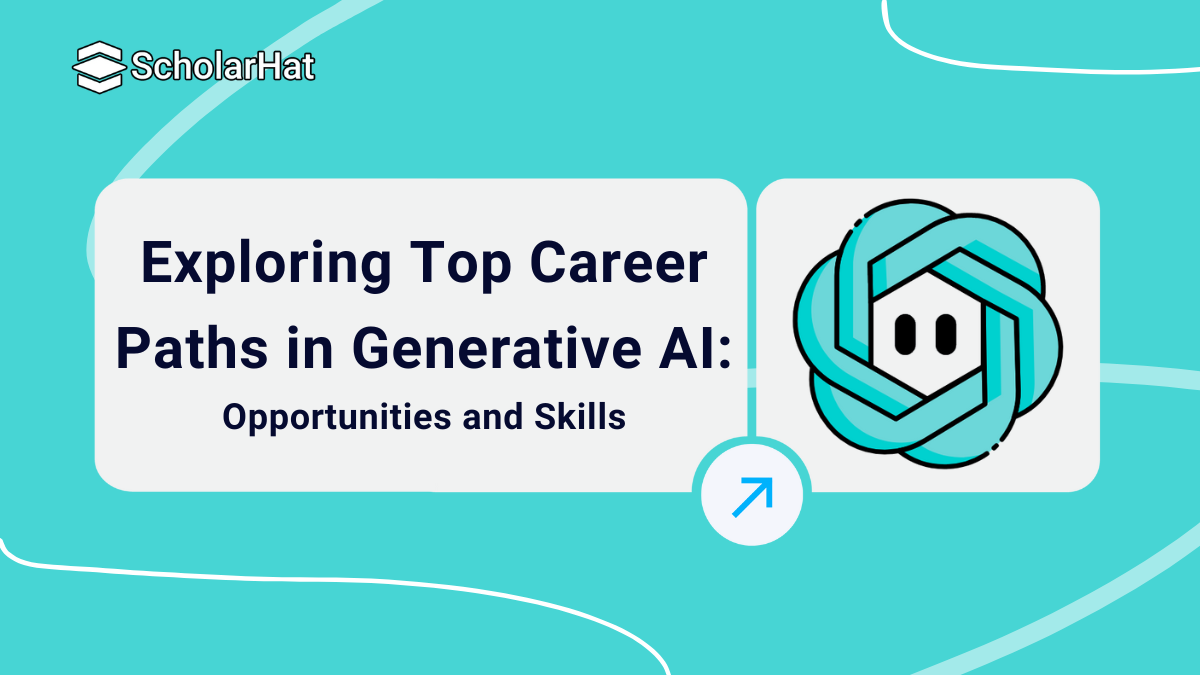18
AprTop Career Options in GenerativeAI
Career Options in GenerativeAI
Career Options in GenerativeAI involve different paths like advanced artificial intelligence and machine learning. These paths require an in-depth knowledge of the methods and tools required to build AI models that can generate data such as photos, text, or music. According to Xpheno, a specialist hiring organization, India's active Generative AI labor pool has grown by 54% in the last year, outpacing the United States and Germany. Globally, the overall talent pool in Generative AI has increased by 46%, reaching 19,000 as of April 2023. The United States, India, the United Kingdom, Germany, Canada, and France account for 60% of this talent pool. OpenAI's ChatGPT and DALL-E are gaining popularity in a variety of sectors, sparking interest in generative AI and how it works.
In this Generative AI tutorial, we'll go over the different career options in Generative AI, which technologies to focus on, and best practices for creating your portfolio. So, let's begin with, "Who is a Generative AI Engineer?". first
Who is a basic Generative AI Developer?
- A Generative AI Developer is an AI specialist who builds and implements generative models and algorithms.
- They work with tools in the field, such as Generative Adversarial Networks (GANs), Variational Autoencoders (VAEs), and large-scale language models, such as GPT.
- They work on the development and fine-tuning of models that would produce novel content in the form of images, text, or audio by identifying and mimicking patterns from the input data.
- This is critical for growing artificial intelligence and machine learning to be applied in creative arts, content creation, virtual reality, and data synthesis, where life-like and creative outputs are needed to drive innovation in such areas.
- At last, to become a Generative AI Developer all you need is to stay updated.
Key Roles & Responsibilities of a Generative AI Engineer
1. Designing, Developing, and Implementing Generative AI Models
- The primary responsibilities of a generative AI engineer are designing, building, and implementing generative AI models.
- They develop AI models that can create new content based on existing data.
- The design is done based on identifying the best algorithm to get the desired output.
- This requires deep knowledge of multiple generative AI algorithms, as well as their strengths and weaknesses.
- Once the algorithm is chosen, the engineer will focus on constructing the model, which will include training with present data and fine-tuning to enhance performance.
- The realization of the AI model means building a solution to integrate an already constructed or newly built model into a system.
- This is where knowledge of software development comes into the picture because there is a need for the engineer to ensure that the model works fine in the system.
2. Tuning Existing Generative AI Models
- Tuning existing generative AI models is an important task for generative AI engineers.
- This process entails changing and refining pre-existing models to improve their performance, adapt to new data, or satisfy project-specific criteria.
- The tuning procedure often requires a thorough examination of the model's behavior, identifying areas where it may be underperforming or producing unexpected outcomes.
- The tuning process often begins with an evaluation of the model's present performance, which is measured using metrics relevant to the task at hand.
- The engineer must identify the model's areas for improvement, such as lowering overfitting, improving generalization to fresh data, or improving the quality of generated content.
3. Developing and Maintaining AI Pipelines
- An AI pipeline is the set of steps involved in training and deploying an AI model. This includes data collection, cleansing, model training, evaluation, and deployment.
- Creating an AI pipeline involves creating and carrying out these processes in a way that enables efficient model training and deployment. This requires a thorough understanding of data science principles and the ability to develop robust code.
- Maintaining the AI pipeline includes checking and updating it on a regular basis to maintain optimal performance. This can include updating training data, fine-tuning model parameters, or upgrading pipeline software.
4. Collaborating with Cross-Functional Teams
- Generative AI engineers often work in larger teams and will, therefore, have to find a way to cooperate with other professionals in defining the requirements for a project and its objectives.
- They may be required to cooperate with a data scientist to know which sort of data is needed to train the model, with software developers to embed an AI model within an existing system, or with project managers to keep the project on track.
- This aspect of the job is very communicative and team-performing. You have to explain rather complex AI things in a way your non-technical coworkers understand.
What Does a Generative AI Developer Do?
- A generative AI developer is the creator behind AI models using advanced machine learning and deep learning techniques to create new, unique content in the forms of images, text, or audio.
- Generative AI developers focus on model design and application for one purpose: either in creativity or in practical purposes. They have rich backgrounds in programming, software development, and data science.
- Generative AI developers have adopted various tools and modes of operation for data processing and AI system design, which are in a state of constant evolution by end-to-end learning.
- Their work includes applications such as content creation, virtual reality, and automated data synthesis.
Skills Required to Become a Generative AI Developer
1. Technical Skills
Master the Basics of AI and Machine Learning
- Adequate understanding and control over the fundamental principles of AI and machine learning that is, algorithms, data structures, the basics of model training, and evaluation form the core base for developing generative AI systems.
Master Essential Programming Languages
- Proficiency in Python, as it is the primary language used for AI development due to its simplicity and extensive library support.
- Knowledge of machine learning libraries like TensorFlow, PyTorch, and Keras will also be important since these are the tools with which the AI models will be built and fine-tuned.
Specialization in Generative AI Models
- Specialization with models in generative AI, such as Generative Adversarial Networks and Variational Autoencoders: learning to design, implement, and optimize these models for the creation of new, realistic content.
Good grasp of deep learning techniques
- Deep learning has primarily been powering generative AI.
- These activities need to have very strong neural network basics, more so architectures such as GANs and Transformers, to be effective in data development and manipulation.
- Dominating such techniques will enable developers to create models that are more sophisticated and high-accuracy.
Natural Language Processing and Computer Vision
- This is in the aspect of having an in-depth understanding relating to natural language processing and computer vision since they are key areas in generative AI.
- NLP is all about teaching machines to understand and generate human language, so it would be essential for all the tasks that text generation comprises.
- Just like knowledge of techniques for image processing would be when dealing with the task of generating and manipulating visual content—for instance, in creating artistic works or synthesizing realistic images.
Skills related to Data Science
- Data preprocessing, statistical analysis, and visualization are significant in the analysis and management of huge datasets associated with applications in generative AI.
- These skills come in handy while preparing data for training models and assessing model performance.
2. Soft Skills
Communication Skills
- Strong communication skills are key to elaborating complex AI concepts before nontechnical stakeholders and working well with cross-functional teams.
Problem-Solving and Analytical Thinking
- Generative AI development often requires grappling with problems that are multi-faceted. Problem-solving and analytical thinking capabilities need to be strong in order to innovate, develop effective solutions, and pave the way through technical obstacles.
Domain Expertise
- Domain expertise is the key to applying generative AI because you need to understand the specific industry or application area at a deep level.
- That will allow you to come up with models that are both technically sound and useful in their use cases.
Top Career Options in Generative AI
Let's see Generative AI's top career options in both technical and non-technical areas.
Technical Career Options in Generative AI
1. Machine Learning Engineer
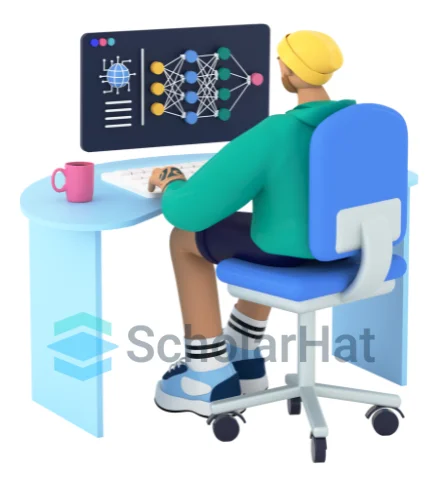
- Coordinate with Software Engineers: As a Machine Learning Engineer, you will have to work closely with data scientists and other software engineers to build and train generative models that are capable of delivering high-quality content.
- Optimizing Algorithms: As a Machine Learning Engineer your job includes optimizing algorithms for efficiency, scalability, and accuracy to guarantee that AI systems work well in a variety of applications.
- Research analysis: As a Machine Learning Engineer you will be in charge of exploring and experimenting with novel ways to improve the capabilities of generative models, ultimately pushing the limits of AI creativity.
- Developing AI Systems: You have to develop AI systems that relate human creativity and intelligence, resulting in the creation of realistic and entertaining content.
- Future in AI: Your work as a Machine Learning Engineer contributes significantly to the advancement of artificial intelligence and defining the future of technology by allowing for the development of more sophisticated and novel AI systems.
2. Data Scientist

- Developing Algorithms: Data scientists working in AI are responsible for developing and implementing algorithms and models to aid in data analysis, pattern identification, and predictive modeling.
- Collaboration with AI Engineers: They work closely with AI engineers to create and refine datasets for generative AI models, assuring their efficacy.
- In-Depth Analysis: Using statistical techniques and machine learning algorithms, data scientists analyze massive datasets in-depth to uncover patterns, anomalies, and correlations.
- Data Cleaning and Preprocessing: They are skilled at cleaning and preprocessing data to improve its quality and relevance when training AI systems.
- Evaluating Model Performance: Data scientists analyze the performance of generative AI models using rigorous testing and validation techniques, examining accuracy, efficiency, and scalability for potential improvements.
- Continuing growth: Data scientists contribute to the continuing growth of generative AI technologies by working with AI engineers to ensure that they meet industry standards and user needs.
3. Software Engineer
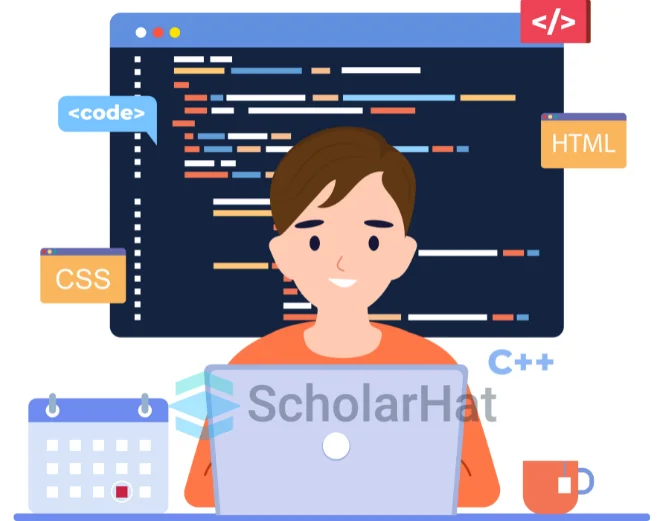
- Designing Scalable AI Systems: As an AI software engineer you will be concerned with creating AI systems that can efficiently handle massive volumes of data and sophisticated computations. You have to ensure that the systems can scale to meet the rising demands of the applications.
- Building Robust Infrastructure: Software engineers provide a robust infrastructure to support the deployment and operation of AI models. This infrastructure includes the storage solutions, computing resources, and networking capabilities needed to execute AI algorithms effectively.
- Integrating Generative AI Models: Engineers are working on incorporating generative AI models into numerous apps to improve their capabilities. They ensure that these models integrate seamlessly with existing software frameworks and produce useful results for users.
- Collaboration with Other Team members: Software engineers work alongside data scientists, machine learning engineers, and domain specialists to ensure that AI pipelines run smoothly. They collaborate to improve the performance of AI systems and address any issues that arise throughout the development process.
4. Robotics Engineer
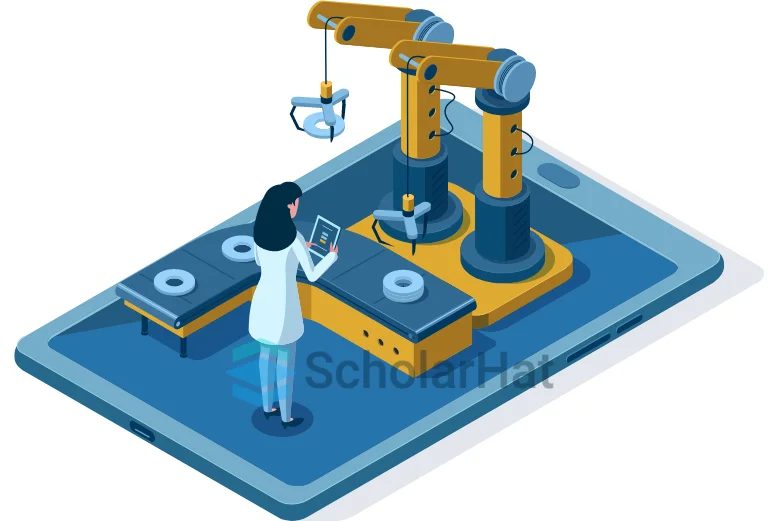
- Creating AI-powered robots: As a robotics engineer with a focus on generative AI, you play an important role in creating AI-powered robots with intelligent and adaptable behavior. This includes creating and implementing AI models that can learn from their surroundings and make intelligent decisions based on the information they receive.
- Creating algorithms: You will be in charge of developing algorithms that allow robots to see, comprehend, and respond to their surroundings in real-time. To ensure that the robots can successfully traverse their surroundings, a thorough understanding of machine learning, computer vision, sensor fusion, and control systems is required.
- Your efforts will also include enhancing the performance of AI models to improve the robots' ability to adapt to changing conditions and unforeseen hurdles. This includes fine-tuning parameters, updating algorithms, and incorporating new technologies to constantly improve the robots' decision-making abilities.
- Collaboration with interdisciplinary teams: A team of software engineers, data scientists, and domain specialists is required for this function. Working together, you will use each other's knowledge to push the limits of what AI-powered robots can do in a variety of applications, including autonomous vehicles, industrial automation, healthcare robotics, and more.
- Future of Robotics: As a robotics engineer who specializes in generative AI, you play an important part in creating the future of robotics by developing intelligent devices able to perform.
5. Prompt Engineer
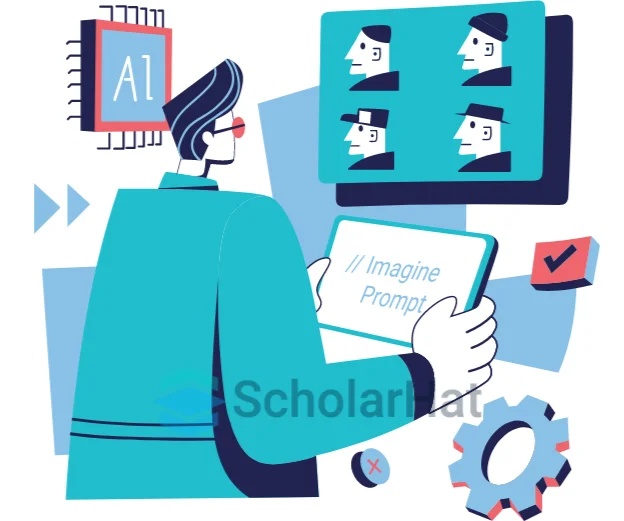
- Understanding the Role of a Prompt Engineer in AI: Prompt engineers are critical members of the AI development team, working with generative AI engineers to design and improve prompts that direct AI model output. Their major task is to create prompts that will direct the AI system to generate the desired material.
- Prompt engineers work closely with generative AI engineers to guarantee that the prompts successfully shape the AI model's outputs. This partnership entails iterating on prompt designs, analyzing results, and changing prompts to optimize the material supplied by the AI system.
- Fine-Tuning AI Models: One of the primary responsibilities of prompt engineers is to fine-tune AI models via improving prompts. They are in charge of modifying the phrasing, structure, and context of prompts to achieve certain content objectives. This iterative process necessitates a thorough grasp of both the AI model being employed and the desired content outcomes.
- Improving Content Generation: Prompt engineers play an important role in improving AI models to generate specific sorts of content. By creating bespoke prompts, they can direct the AI system to generate outputs that satisfy specific criteria, such as style, tone, or subject matter. This capacity to modify content output makes prompt engineering a useful skill in a variety of professions, including writing, marketing, and entertainment.
- Skill Set and Qualifications: To succeed as a prompt engineer, candidates should have a strong understanding of AI concepts, programming languages typically used in AI development (such as Python), and expertise dealing with natural language processing tools. Strong analytical abilities, inventiveness in prompt design, and the ability to work effectively with a multidisciplinary team are all required for success in this profession.
Non-Technical Career Options in Generative AI
- Research Scientist: Conduct cutting-edge research to create new generative AI models and algorithms.
- Computer Vision Engineer: Develop picture synthesis and style transfer using generative AI in computer vision.
- Natural Language Processing (NLP) Engineer: Develop generative AI models for text synthesis, machine translation, and summarization.
- Game Developers: Game Developers use generative AI to create game material such as maps and characters.
- Creative AI Artist: Use generative AI to create unique art and music compositions.
- Autonomous Systems Engineer: Create generative AI to enable more natural behaviors in autonomous agents.
- AI Product Manager: Oversee the development of generative AI products and applications.
- AI Ethicist: Examine the ethical implications and biases in AI-generated material.
Career Path Progression for a Generative AI Developer
1. Entry-Level Position: Junior Generative AI Engineer
- Usually, an individual will first become a Junior Generative AI Engineer in an entry-level position.
- By now, you should have an elementary understanding of the ideas of AI and machine learning, be adept in Python, and more or less understand several frameworks in machine learning.
- The main responsibilities at this level often include assisting in the construction of AI models, data clean-up and preparation, and applying basic machine learning algorithms under the supervision of more experienced engineers.
2. Mid-Level Position: Generative AI Engineer
- As one gets expertise and advanced talents, they rise to a mid-level role as a generative AI engineer.
- At this level, the engineer can be expected to work more on building and implementing complex AI models, optimizing algorithms, and making architecture decisions with AI projects.
- They are also expected to work with other teams and stakeholders to ensure that the AI solutions being created meet the objectives and requirements of the project.
3. Advanced Position: Senior Generative AI Engineer
- The next step in the career is to become a Senior Generative AI Engineer.
- The engineer at this stage must have detailed expertise in AI and Machine Learning and vast experience in the development and deployment of AI systems.
- Their duties include coding, but go beyond this: it is strategic. It contains leadership on AI projects, teaching new engineers, and being abreast of new trends in AI and machine learning.
How ScholarHat Can Help You
Master Generative AI Development with ScholarHat.Be a pioneer in the AI revolution. ScholarHat provides a Master's Program to equip you with the skills required to develop cutting-edge AI and Generative AI applications.Our program includes:
- AI Foundations: Learn the fundamental principles and applications of artificial intelligence.
- Mastering Generative AI: Discover how to use generative models to build new solutions.
- Practical Applications: Get hands-on experience with industry-leading tools such as ChatGPT and Gemini.
- Full-Stack Development with Copilot: GitHub Copilot can help you code more efficiently and productively.
- Advanced Machine Learning: Learn the techniques for creating complicated AI models.
- PyTorch Proficiency: Gain experience in this powerful deep-learning framework.
- GAN Specialization: Learn how to generate realistic data with Generative Adversarial Networks.
- Transformer Architecture: Understand the foundation of cutting-edge language models.
- Capstone Project: Use your knowledge to solve real-world problems and enhance your portfolio.
Are you ready to become a Generative AI expert? Enroll in ScholarHat today to begin your journey.
Read Our: |
Summary
How Can I Become a Generative AI Developer in 2025? This comprehensive handbook outlines the necessary skills, positions, and duties. It explains the technological abilities required, including Python, deep learning, and generative models such as GANs. It also depicts career progression from entry-level to senior roles. It discusses how ScholarHat's Generative AI for Software Developers Program can help you gain the skills required to excel in Generative AI development.


